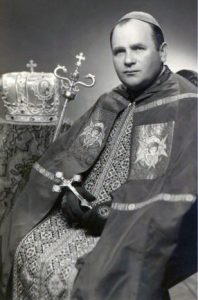 Blessed Basil Hopko, bishop-martyr of Medila
Blessed Basil Hopko, bishop-martyr of Medila
Basil or Vasiľ Hopko (April 24, 1904—July 23, 1976) was a priest and bishop of the Slovak Greek Catholic Church. He was beatified by Pope John Paul II for his martyrdom under Communist occupation.
Hopko was born in the Rusyn village of Hrabské, Austria-Hungary in county Šariš, presently in eastern Slovakia. His parents, Basil and Anna née Petrenko, were landless peasants. While Hopko was still an infant, his father was struck by lightning and died. His mother left him in care of her father, while she emigrated to the United States in search of work. When Hopko was 7 he was sent to live with his uncle Demeter Petrenko, a Greek Catholic priest.
He attended the Evangelical gymnasium in Prešov, then Czechoslovakia, graduating with honors in 1923. Hopko studied at the Eparchial Seminary in Prešov. He had dreams of joining his mother in America, and of pursuing his priestly vocation there, but the cost of recurring health problems left him unable to afford to travel. He later wrote that when he finally decided to stay and to serve in his homeland, he was suddenly cured, and realized he had been given a sign about his calling. He was ordained a Greek Catholic priest on 3 February 1929.
He served as a parish priest (1929–1936) at the Greek Catholic parish in Prague, the Czechoslovak capital, where he was known for his focus on the poor, the unemployed, and students. His mother returned from the US after 22 years and rejoined her son in Prague, becoming his housekeeper at the parish rectory.
In 1936 he returned to teach in Prešov’s Eparchial Seminary, and was awarded the title of monsignor. He had already begun graduate studies at Charles University while in Prague, and he completed his Doctor of Theology in 1940 at Comenius University in Bratislava. In Prešov he headed the Eparchy’s publishing division, where he edited a monthly periodical.
After World War II, a growing Soviet Bolshevik influence caused Bishop Pavol Peter Gojdič of Prešov to ask the Vatican for an Auxiliary Bishop to help defend the Greek Catholic Church. Hopko was appointed to the post on 11 May 1947. The Communist take-over of Czechoslovakia wreaked havoc on the Greek Catholic Church. In 1950 it was officially abolished, and its assets were turned over to the Russian Orthodox Church. Gojdič was arrested and was imprisoned for life. Hopko was arrested on 28 April 1950 and kept on starvation rations and tortured for weeks. Eventually he was tried and sentenced to 15 years for the “subversive activity” of staying loyal to Rome. He was repeatedly transferred from prison to prison. His health, physical and emotional, failed, and in 1964 he was transferred to an old age home. He never recovered his health.
During the Prague Spring the Czechoslovak government legally cleared Hopko on 13 June 1968 and the Prešov Eparchy was restored. However, activists insisted that a Slovak bishop be appointed to the see, and the Vatican named the Slovak priest Ján Hirka as Hopko’s successor.
Hopko died at age 72 in 1976. On 14 September 2003 Pope John Paul II beatified him at a ceremony in Bratislava, Slovakia.
(Biography edited by J.M. Thompson)
Feast day: July 23
****
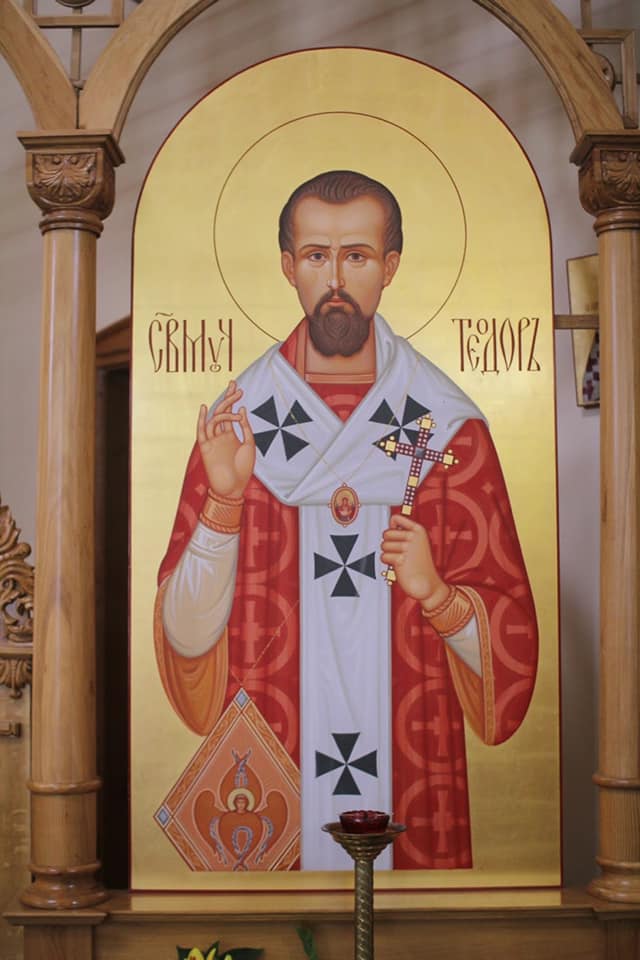 Blessed Theodore Romzha
Blessed Theodore Romzha
In the Byzantine Catholic Church keeps the feast of Blessed Theodore Romzha is celebrated on October 31. He was a martyred bishop of Mukachevo in Transcarpathia who was killed by the Soviets in hatred for the faith.
“I love you, O Lord, my strength; You are my stronghold and my refuge!” (Psalm 18: 2-3)
These were the words which Bishop Theodore G. Romzha, the Apostolic Administrator of the Mukachevo Eparchy (1944-1947), chose as the motto for his episcopal ministry. At the age of 33, he faced the one of the most brutal and bloody persecutions of a Christian community in modern times, ultimately making the ultimate sacrifice for his flock and his faith.
Bishop Romzha was beatified by Pope John Paul II on June 27, 2001. His relics are enshrined in Holy Cross Cathedral in Uzhorod, Transcarpathia.
His feast was originally celebrated on November 1. During the days of the Soviet control of Ukraine, there was but one “time zone” in the U.S.S.R. The bishops of Ukraine petitioned Rome that the feast date be changed to October 31, due to the fact that it was on that date that the martyr was actually murdered.
Feast day: October 31
****
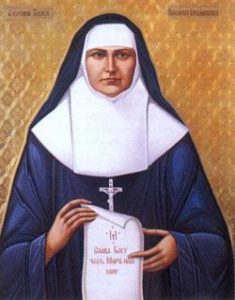 Blessed Josaphata Michaelina Hordashevska (Yosafata Mykhailyna) was born on November 20, 1869, Lviv, Ukraine and died on April 7, 1919, Chervonograd (a. k..a. Krystonopol), Ukraine.
Blessed Josaphata Michaelina Hordashevska (Yosafata Mykhailyna) was born on November 20, 1869, Lviv, Ukraine and died on April 7, 1919, Chervonograd (a. k..a. Krystonopol), Ukraine.
Until Josaphata, the only option for a Ukrainian Catholic woman who wanted to lead at consecrated life was a contemplative order. Michaelina, as she was baptized, was about to enter such a contemplative order when she was invited to assist two priests who were forming a new apostolic congregation. In 1892 she became the first member of the Sisters Servants of Mary Immaculate and took the religious name Josaphata in honor of the Ukrainian martyr Josaphat Kuntsevych. With no tradition to guide her, Josaphata simply looked for what her community needed and came up with solutions. The Sisters Servants cared for the sick, founded daycare centers for children, taught adults the basics of Christian living, cared for neglected village churches, and sewed church vestments. Living in a village without a doctor or a pharmacy, Josaphata even learned to mix medicinal herbs and medications. Josaphata’s contributions were not always appreciated. Some priests and even some sisters did not believe that a woman could govern a congregation. She was forced to resign from the office of superior general and was twice denied permission to make her final vows. In 1909 she was barred from her own General Chapter meeting because only Sisters with perpetual vows were permitted. On May 10, 1909 the Sisters elected Josaphata vice-general in absentia, and she finally pronounced her perpetual vows the following day, seventeen years after she had cofounded the congregation. She died, leaving more than fifty foundations, some as far as Canada and Brazil. Josaphata has become known as a powerful intercessor.
The Genius of Josaphata: Throughout her many trials, Josaphata never lost confidence in the mercy of God and the power of his Blessed Mother. She always advised her Sisters: “I entrust everything to our Mary Immaculate.”
Reflection: “It is idle to say God does not hear / or that the Almighty does not take notice. / Even though you say that you see him not, / the case is before him; with trembling should you wait upon him.” (Job 35:13-14)
From Sarah Gallick, The Big Book of Women Saints (HarperOne, 2007), p. 351
More on her canonization process is found here.
Feast day: November 20
****
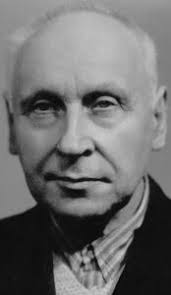 Blessed Ivan Sleziuk
Blessed Ivan Sleziuk
Ivan Sleziuk is one of the Ukrainian martyrs from the Soviet era persecution of the Church. He was born January 14, 1896, ordained priest in 1923 and ordained bishop in April 1945. Arrested in June 1945 and sentenced to 10 years in a labor camp and then after a release was arrested a second time and sent to a prison camp for another 5 years being released in 1968. Bishop Ivan died on December 2, 1973.
Bishop Ivan Sleziuk was beatified by Pope John Paul II on 27 June 2001 in Ukraine.
Feast day: December 2
****
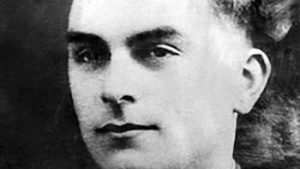 Blessed Petro Pavlo Oros, a martyr
Blessed Petro Pavlo Oros, a martyr
The Holy Father Pope Francis authorized to promulgate the Decrees concerning the martyrdom of the Servant of God Petro Pavlo Oros (14 July 1917 – 28 August 1953), Priest of the Eparchy of Mukachevo (Ukraine), thus beatifying one of the underground bishops, killed in hatred of the faith on 28 August 1953. The date of death is significant: it was the feast of the Dormition of the Mother of God (on the Julian calendar).
Blessed Theodore Romzha was the consecrator of Father Petro Pavlo to the episcopate.
This event will be celebrated also in the Eparchy of Passaic: on Saturday, October 29th at 10am the Hierarchical Divine Liturgy will be celebrated at St Mary Byzantine Catholic Church in Hillsborough, New Jersey. Metropolitan William Skurla will serve the Liturgy.
****
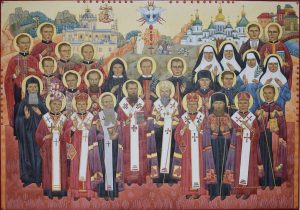 On June 27 we have the common commemoration of Bishop Nykolai (Nicholas) Charnecky and the Twenty-Seven Other New Blesseds of the Church of Rus`-Ukraine Beatified in 2001 by St. John Paul II, pope.
On June 27 we have the common commemoration of Bishop Nykolai (Nicholas) Charnecky and the Twenty-Seven Other New Blesseds of the Church of Rus`-Ukraine Beatified in 2001 by St. John Paul II, pope.
Ukrainian Greek-Catholic Church:
Bishop Mykola Charnetskyi
Bishop Semeon Lukach
Bishop Ivan Sleziuk
Bishop Vasyl Velychkovsky
Bishop Hryhorii Khomyshyn
Bishop Josaphat Kotsylovsky
Bishop Mykyta Budka
Bishop Hryhorii Lakota
Father Mykola Konrad
Father Andrii Ischak
Father Severian Baranyk
Father Yakym Senkivskyi
Father Zenovii Kovalyk
Father Emilian Kovch
Father Vitalii Bairak
Father Roman Lysko
Archimandrite Klymentii Sheptytsky
Father Mykola Tsehelskyi
Father Ivan Ziatyk
Fahter Petro Verhun
Father Oleksii Zarytskyi
Sister Josaphata (Michaelina) Hordashevska
Sister Olympia Olha Bida
Sister Lavrentia Herasymiv
Sister Tarsykia Matskiv
Volodymyr Pryima
Ruthenian Greek-Catholic Church:
Bishop Theodore Romzha
Russian Greek-Catholic Church:
Exarch Leonid Feodorov